Indiana’s gubernatorial candidates gathered for a third debate Oct. 24 in Indianapolis. The debate offered a chance for the candidates to enforce their stances on issues important to many Hoosiers and reiterate key campaign points.
All three governor candidates were present, including Donald Rainwater (L) — who was not invited to the first debate in early October — Jennifer McCormick (D) and Mike Braun (R). This was the third televised debate McCormick and Braun showed off in.
The event was hosted by WFYI, presented by the Indiana Debate Commission, and moderated by Laura Merrifield Wilson, an associate professor of political science from the University of Indianapolis and host of WICR radio’s “Positively Politics,” according to the Indiana Debate Commission.
All candidates were allowed one minute to respond to questions submitted by concerned Hoosiers in the state’s population who were picked from the debate commission. Question and appearance order were chosen by a draw. All candidates were held to their minute time and offered 30 seconds for a rebuttal as requested. The moderator also was welcome to ask questions as a follow up if needed.
During the debate, the candidates tackled issues, such as the economy, abortion, education, property taxes and more.
McCormick and Rainwater both took the debate as an opportunity to take verbal jabs at Braun.
“Senator Braun admitted tonight that he is the ultimate insider with lots of government experience, and he’s done a lot of things in government,” Rainwater said near the debate’s conclusion. “… which means all the things that you’re frustrated with the federal government or the state government, he’s right in the thick of it. And if you want change, he’s not going to change anything.”
McCormick repeatedly made comments about Braun’s running mate, Micah Beckwith, being a “heartbeat” away from the governor position and claimed he was the one “running the campaign.”
“We’ve not had such an extreme candidate in that position that I can remember in my adult life … He’s also clearly calling the shots. Let’s just call it what it is: This isn’t the Braun-Beckwith ticket — this is the Beckwith-Braun ticket,” McCormick said. “And that is showing us what to expect if he were to get elected.”
Braun encouraged Hoosiers to look at their political histories and past accomplishments.
“Look at the track record of whether you get something done, not whether you’re going to say you’re going to do it,” he said.
Candidates were welcomed to speak to reporters from various outlets after the debate for follow-up questions. McCormick and Rainwater met with reporters while Braun declined the invitation before the debate began, according to the Indiana Debate Commission.
RELATED: Jennifer McCormick and Terry Goodin on their 'common sense' legislative plans

DIDN’T WATCH THE DEBATE? HERE’S A RECAP OF THE TOPICS DISCUSSED:
Economy and Property Taxes
McCormick said the economy depends on human capital and related topics like healthcare, reproductive freedoms and the prioritization of education. Those issues are about “common sense and balance.” McCormick repeated this key phrase throughout the debate, as it is a key platform point in her “common sense” campaign plan.
Braun cited his 20 years of firsthand experience as a small-town businessman, living “the American dream.” Braun said if a politician has ideas on what to do within their position, it’s “important that [they]’ve lived through it.”
Braun said Indiana has a plethora of economic potential that needs to be spread across all four corners of the state, from small businesses to entrepreneurs.
Braun also took this time to point out he believes Hoosiers should know McCormick “supports Bidenomics,” and asserted his belief that her campaign is tied to national inflation. McCormick did not directly respond to this claim.
Rainwater said although it may seem the economy is doing great, the reality is different for Hoosier families sitting down at their kitchen table amongst a pile of bills due to the consequences of inflation.
“The reality is we don’t need more jobs,” Rainwater said, citing the state’s current worker shortage data, published by the U.S. Chamber of Commerce.
According to that data, there are 72 workers available for every 100 jobs open. There are 162,000 jobs open and 117,400 unemployed workers.

Rainwater assured Hoosiers he has plans to not only lower property taxes but to end them altogether, saying that he believes communities have other ways to fund things property taxes contribute to, like firefighters, police and schools. He did not specify what these sources of alternative funding would be but suggested that communities could stop funding “vanity projects” and brought up “tax increment financing.”
“Tax increment financing has been around for several decades in Indiana,” Rainwater said to the media after the debate. “As property taxes increased because an area was becoming more vitally renewed, [communities] would be able to take some of that money and reinvest.”
Housing Crisis
McCormick referenced her “common sense property tax plan,” adding it “goes back to fair lending, making sure we’re protecting our renters and being a good partner with our local level leaders.”
Braun’s solution to Indiana’s lack of affordable housing is to partner with entrepreneurs to build housing that’s within the budget of a young Hoosier family, Braun said.
“Entrepreneurs will figure that out. The federal government is not going to be weighing in and doing it responsibly. Our own state can help make that easy for the folks that know how to do it,” he said.
Rainwater said the root of Indiana’s housing crisis is property taxes. Per his campaign point, Rainwater said Indiana property taxes must have a fixed cost and an end date.
RELATED: Micah Beckwith wants a "more conservative state"

Education and School Choice
Both Braun and Rainwater shared support for school vouchers, which are typically used by wealthy families who eschew public school systems. McCormick has called for a pause on the program and more accountability for schools getting public dollars.
McCormick said Hoosiers “deserve transparency, accountability and some answers.”
Braun additionally emphasized the idea of career-based training in Indiana to align with the state’s agricultural values and ensure employment rates for ensuing decades.
“We need to align [education] in a way that is data-driven and creating skill training based on high-demand, high-paying jobs,” he said.
Rainwater said he was “100 percent in favor” of universal school choice but underscored that, in his view, public school systems were a monopoly, “and monopolies traditionally drive down quality and drive up cost.”
Similarly in the realm of education, heated conversation sparked when McCormick criticized Braun’s comments which said McCormick’s only time in public service was during her four years as Superintendent of Public Instruction.
“Shame on you. I was a teacher for 25 years, and if we’re saying that teachers aren’t public service, that sends a true message to Hoosiers of who you are,” McCormick said.
Gun Safety and Policies
All three candidates shared pro-gun points with varying policy plans.
McCormick, a self-proclaimed gun owner, asserted that she wants to listen to state police and local law enforcement, continue to enforce red flag laws, and to ensure “get people care when they are vulnerable,” referring to mental health care and resources.
Braun said he also plans to continue enforcing red flag laws to “keep guns out of the hands of the mentally ill.” McCormick pointed out that Braun’s running mate, Beckwith, has said in past Facebook posts that Beckwith sees red flag laws as “unconstitutional.”
Rainwater said he is opposed to red flag laws because he does not believe the government has the right to enforce who can and cannot own a gun.
Abortion and Reproductive Rights
Braun doubled down and supported legislation like 2022’s Senate Bill 1, which bans abortion in the state. Braun said legislators had “vetted” the bill and provided “reasonable exceptions.” He called the bill a “good product” and said it reflected the views of the majority of Hoosiers.
McCormick countered, saying the bill was not well vetted and did not consider the views of Hoosiers because there is not a ballot initiative in Indiana, which she vows to implement. McCormick repeated a common speaking point of her campaign, pointing out she is the only female candidate and the “only one who has been pregnant and given birth.”
McCormick referred back to Braun’s running mate, Beckwith, who claimed he does not want exceptions for rape and incest for abortions.
Rainwater did not provide a clear stance on abortion, but said Hoosiers should “make their voices heard to legislators.”
In a past interview with the Ball State Daily News, Rainwater stated he was a “pro-life libertarian” but believed that medical decisions - including abortions, COVID restrictions and vaccinations - should not be left to the government.
Related: Donald Rainwater and Tonya Hudson want to take on taxes

Marijuana Regulation
All three candidates called for the legalization of marijuana in varying degrees.
Braun called for the legalization of medical usage of marijuana, saying he would work with law enforcement and use medical legalization to “see what happens” before deciding on recreational usage.
McCormick pointed to her “common sense cannabis plan,” calling it a bipartisan-approved plan that starts with medical usage legalization, the creation of a cannabis commission and learning from other states to pursue a plan of eventual recreational legalization.
Rainwater said all forms of marijuana usage, medical and recreational, should be “legalized immediately.” He said there is no need for commissions and the “inalienable right to what you put in your body is not up for discussion”
Wages, Jobs and Unions
Multiple questions surrounding wages, right-to-work laws, state agency budgets and the worker shortage were asked.
When asked about state agency budgets and concerns about the decreasing salaries for state workers, none of the candidates provided a clear stance or plan. They cited that they would have to see the budget and make decisions based on that information when the time comes.
All three candidates had various support for unions and varying approaches to supporting the right-to-work laws in the state. McCormick said it's important the government supports workers and is business friendly. Braun said, “Unions always have a place.”
Rainwater said he supports unions but thinks Hoosiers shouldn’t let the government set rules and regulations about decisions.
All voting registration deadlines have passed in the state and early voting is already underway. Election Day is Nov. 5.
Contact Olivia Ground and Katherine Hill via email at olivia.ground@bsu.edu or katherine.hill@bsu.edu.





The Daily News welcomes thoughtful discussion on all of our stories, but please keep comments civil and on-topic. Read our full guidelines here.